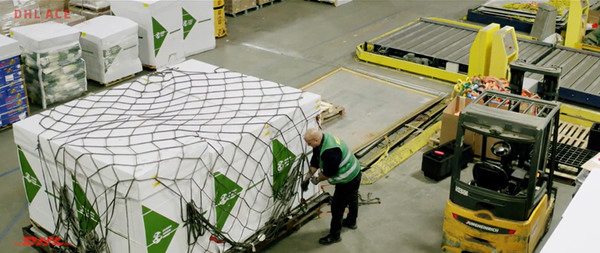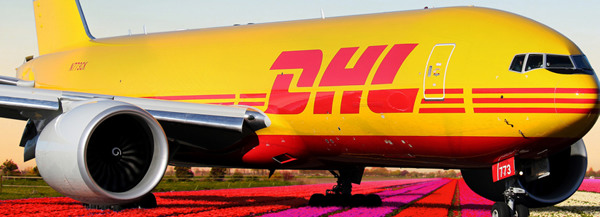Mario Volkers and Ivo Koopmans have decades of perishable goods logistics experience. They recently joined DHL Global Forwarding, where Mario is responsible for sea and Ivo for air freight. This logistics player has a new brand - DHL ACE (Advanced Coolchain Experience).
Under this, they guarantee the correct transportation of perishables in optimal conditions, per regulations. Thanks to the brand's global door-to-door logistics service, it optimally uses the group's network. "Companies that call us don't have to dial numerous numbers; they get to speak to their regular contact," say the men.

Chilean cherries and berries
"DHL Global Forwarding's biggest advantage is its network. We have charter solutions for air and sea freight to and from various destinations. That lets us entirely unburden our customers. There are endless possibilities for all goods that require temperatures between -30 and +30°C. And we won't hesitate to use both these modes of transport if they complement each other," says Mario.
"I always mention the air freight possibilities to my clients, and I know Ivo does the same for ocean freight. Chilean cherries and blueberries that come to Rotterdam by boat are a good example. We ensure that Ivo's team at Schiphol gets the fruit in good condition. He then gets to work on cooling, cross-docking, and packaging the fruit for export via air freight. That's DHL ACE in a nutshell."
"DHL began rolling out its activities in the reefer segment in South America. The company has a reefer desk in every country there. Later, this concept was rolled out to Asia. Europe followed, with Rotterdam immediately considered a vital (transit) port. A vast quantity of fruit comes and goes through there," Mario continues.
"The Ocean Freight division relocated to a future-proof office building during the pandemic. We've since expanded our service range and have reefer desks in Belgium, Germany, Italy, France, and Spain. We offer the market tailor-made import as well as export solutions."

Click here to see the corporate video.
New airfreight facility in 2023
"DHL has lofty ambitions for the airfreight segment, too," adds Ivo. "We provide air freight to all requested destinations, but we're absolute specialists when it comes to Dubai. That's for fruit, vegetables, meat, fish, and flowers. For that, we use the same proven concept to partner with our sister company, DHL Aviation."
"We should begin using a new 20,000m2+ space in 2023. One part is fully equipped for perishables. The building has assorted modern refrigeration facilities where we can guarantee various products' cold chain. It also has Dutch Quality Bureau and Netherlands' Food and Consumer Product Safety inspection points."
"We can, thus, facilitate all the necessary customs formalities. All our disciplines will come together, and we'll be able to perform all services under one roof. All in all, a dream come true. It also proves that DHL is genuinely committed, long-term, to handling perishables as well. This commitment permeates all our organization's layers," he says.
Both sea and airfreight have faced major logistical challenges in recent years. "I'm a little hesitant to call it unprecedented. There have been several situations with tight capacity in recent decades, such as the ash cloud in Iceland and, more recently, the global pandemic. And the products we may transport have to deal with maximum price elasticity. For some destinations, both import and export tariffs are so high that certain trade flows simply aren't going there at present."
"Take Japan, for example: because air freight has become too expensive, hardly any bell peppers are flown there at the moment. There are also significantly fewer tomatoes being exported to the United States. Rates seemed to have stabilized somewhat in recent weeks, but capacity definitely isn't back to its former level. The biggest current challenge is carriers' fluctuating rates," Ivo continues.

Mario agrees that there are challenges aplenty for ocean freight too. He sees to reefer-related cargo at DHL Global Forwarding. "The different carriers genuinely presently dictate the market. They determine the market situation for many exporters. We, too, have to deal with discontinued trade lines. We can, for instance, no longer use certain services to Australia and New Zealand."
"Also, getting reefer containers is still an issue. Sometimes shipping companies have enough of these, but they only use them for specific trade routes. Then, even though your customer is okay with the rates, you can't arrange the shipping. You have to have everything in line to guarantee a good package for your client," he explains.

Sea and airfreight charter solutions
"However, at this year's Fruit Logistica, I noticed shipping companies were approaching each other more to see how they can organize things together. That hardly ever happened two years ago. Some have even stopped accepting consignments altogether. But once equipment availability improves, forwarders will give preference to those companies that are willing to help them now," Mario expects.
What places DHL apart? Its service, both men agree. "DHL is a huge company, but we have a small, close-knit team that handles perishables' logistics. We believe in personal customer contact with regular contact people. Clients are sometimes reluctant to be a mere number within a large organization. However, when it comes to perishables, we're the single point of contact. There's always a person on the other end of the line."
"So, customers don't get stuck with dialing numbers. That suits us down to the ground. We represent DHL to customers and know our way around our organization. We can, thus, optimally unburden our clients. And we don't treat them in a standard way; we give the customers what they want. For one, that may be a door-to-door solution; for another, a bit of consulting. But we consider no client too big or small," Mario concludes.
 For more information
For more information
Ivo Koopmans / Mario Volkers
DHL Global Forwarding
Emails: [email protected] / [email protected]
Website: www.dhl.com
